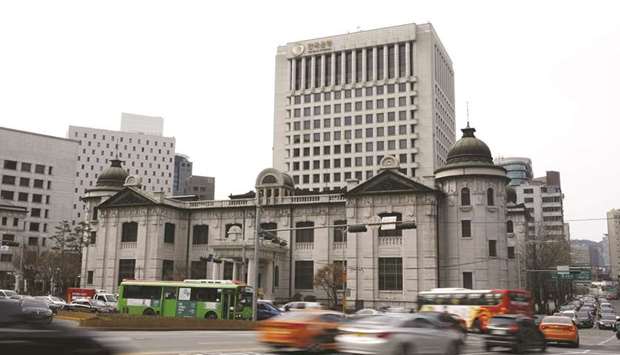The good times for South Korean bonds may be coming to an end as investors bet that a potential interest rate increase by the central bank as early as this month will be the first of many.
Shorter-maturity notes have suffered losses since Bank of Korea governor Lee Ju-yeol hinted at the possibility of a hike on October 23, with the yield on sovereign debt due in 2020 climbing to its highest in almost three years. Swap traders are pricing in an almost 75-basis point rise in the benchmark rate over the next 12 months, up from 50 basis points two weeks ago.
The rising rate rhetoric is making money managers wary of South Korean bonds, which have seen inflows from global funds more than double this year to $30bn. The notes, like their peers in other emerging-market countries, are also at risk from higher US borrowing costs, with the Federal Reserve looking set to tighten for a third time this year in December, and follow that with another three hikes in 2018.
“Be careful, especially in December,” said Hwangbo Young Ok, chief investment officer at Korea Investment Management Co, who oversees 33tn won ($29.6bn) in assets including stocks. “The debate over how fast the BoK will tighten following its initial hike, topped with other year-end factors which tend to involve a liquidity crunch, will cast uncertainties in the market.”
Hwangbo expects the central bank to raise its seven-day repurchase rate at the November 30 meeting, a view echoed by Goldman Sachs Group Inc, Nomura Holdings Inc and JPMorgan Chase & Co. He expects two more hikes through 2018 and early 2019. While the BoK held the base rate at a record low 1.25% on October 19, investors were surprised by hawkish comments from the governor and a dissenter calling for a rate hike.
Global funds sold a net $1bn of Korea-listed bonds last week, the biggest single-day outflow since October 12, according to the Financial Supervisory Service. The yield on South Korea’s three-year bonds last week touched the highest level since December 2014. It was at 2.13% on Thursday, while that on the benchmark 10-year notes was at 2.54%.
Aberdeen Standard Investments says tension over North Korea, along with expectations of policy tightening and the seasonal liquidity crunch, has kept it away from South Korean bonds.
“We’ve been short, and in most of our funds we don’t have any allocations to Korean bonds at all,” said Leong Lin Jing, a Singapore-based investment manager at Aberdeen, which oversees $758bn globally. “I’m more inclined to watch what happens to rates when liquidity tightens at the end of the year” to assess whether to go back to the bonds, rather than wait for developments on the policy outlook, she said.
A resumption of Chinese tourism to South Korea as a result of easing tensions between the two countries should help boost growth for Asia’s fourth-largest economy, in turn prompting the BoK to hike policy at a steeper rate, Nomura economists wrote in a report this week.
“We are generally neutral to underweight on the bonds,” said Manu George, a Singapore-based fixed-income director at Schroder Investment Management. “We need to see a meaningful pickup in yields to increase our allocation to them.”
The logo of the Bank of Korea is seen on the top of its building in Seoul. The good times for South Korean bonds may be coming to an end as investors bet that a potential interest rate increase by the central bank as early as this month will be the first of many.

FUNDS
